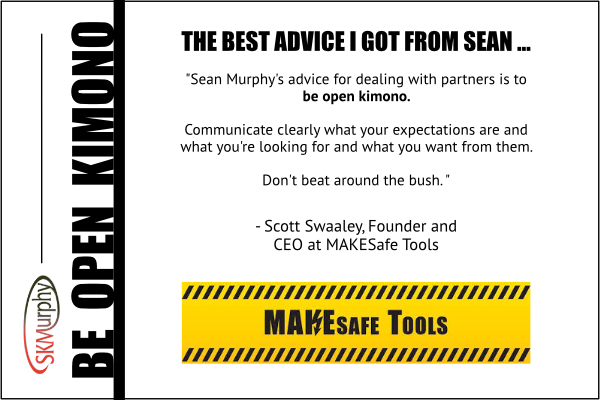Work with trusted partners open kimono: disclose relevant financials, plans, and internal processes to increase synergy. Play a long game.
Be Open Kimono With Partners

“Sean Murphy has helped me strategize on distributor agreements. For one distributor discussion, Sean reminded me that we are not the passive participants in the negotiations and not to freely give a distributor discount unless they’re going to talk to you about expected volumes or minimums. As a small company, it’s very easy to think you don’t have that power, but it is powerful to ask, ‘Are those projections or do you want those to be minimums?’
Early advice for dealing with partners is to be open kimono. Communicate clearly what your expectations are and what you’re looking for and what you want from them. Don’t beat around the bush.
He helped define clear limits on where they can sell to minimize channel conflict. Some restrictions are industry verticals and time frames. He also ensures that we know how to get out of the deal before we get into the agreement. He reminded me that asking for exclusives means they need to agree to minimums. And if they fail to achieve those minimums, they become non-exclusive.” – Scott Swaaley, Founder and CEO at MAKESafe Tools, Inc.
SKMurphy Take: Partnerships require transparency to create value for both parties. Each partner needs to disclose their perspective on current shared risks and opportunities, their plans to mitigate or exploit them, and a mutual recognition of each other’s strengths and weaknesses. The key to establishing a successful partnership is making and meeting commitments in parallel with progressive mutual disclosure, where each party opens up a little more with information and plans that are relevant to shared risks and opportunities. Sydney Harris observed that, “Winners have a healthy appreciation of their abilities and an awareness of their limitations.” They bring this same approach to any partnership, understanding candor builds trust and enables synergy.
More about MAKESafe Tools
Headquartered in San Diego, CA, MAKESafe Tools, Inc. manufactures the MAKESafe Power Tool Brake. Our emergency stop system protects machine operators from accidental restarts, emergency situations, and coasting machinery.
Related Blog Posts
- Scott Swaaley Launches MakeSafe Tools to Improve Workplace Safety
- Scott Swaaley, Founder & CEO of MAKESafe Tools on SKMurphy’s Mastermind Group
- Structuring Business Relationships: Employees, Contractors, Alliances, Partners and Co-Owners
- Killer Instinct Can Blind You to the Value of Partners
- Crafting Deals with Customers and Partners
- The Likely Consequences of Entrepreneurship Require Perseverance
- 12 From Sydney J. Harris’ “Winners and Losers” For Entrepreneurs
A Note on Open Kimono
- Open Kimono: characterized by complete honesty and full disclosure. The term stems from feudal Japanese times where the term signified that the party will hide nothing within his
clothing (the kimono was the dominant clothing of that era) that could conceivably be used as a weapon. From “The New Partridge Dictionary of Slang and Unconventional English” - Open Kimono means to reveal what is being planned or to share important information freely. Similar to ”open the books” or an “open door policy,” opening the kimono means revealing the inner workings of a project or company to an outside party. The practice is also referred to as “opening (up) one’s kimono.” Companies often keep internal projects a secret, especially if they feel it will create a competitive advantage. When companies partner together for synergy, divulging some of the interior workings of your business can build trust and create a deeper, more loyal relationship between the corporate leadership. From Investopedia’s “Open Kimono“
